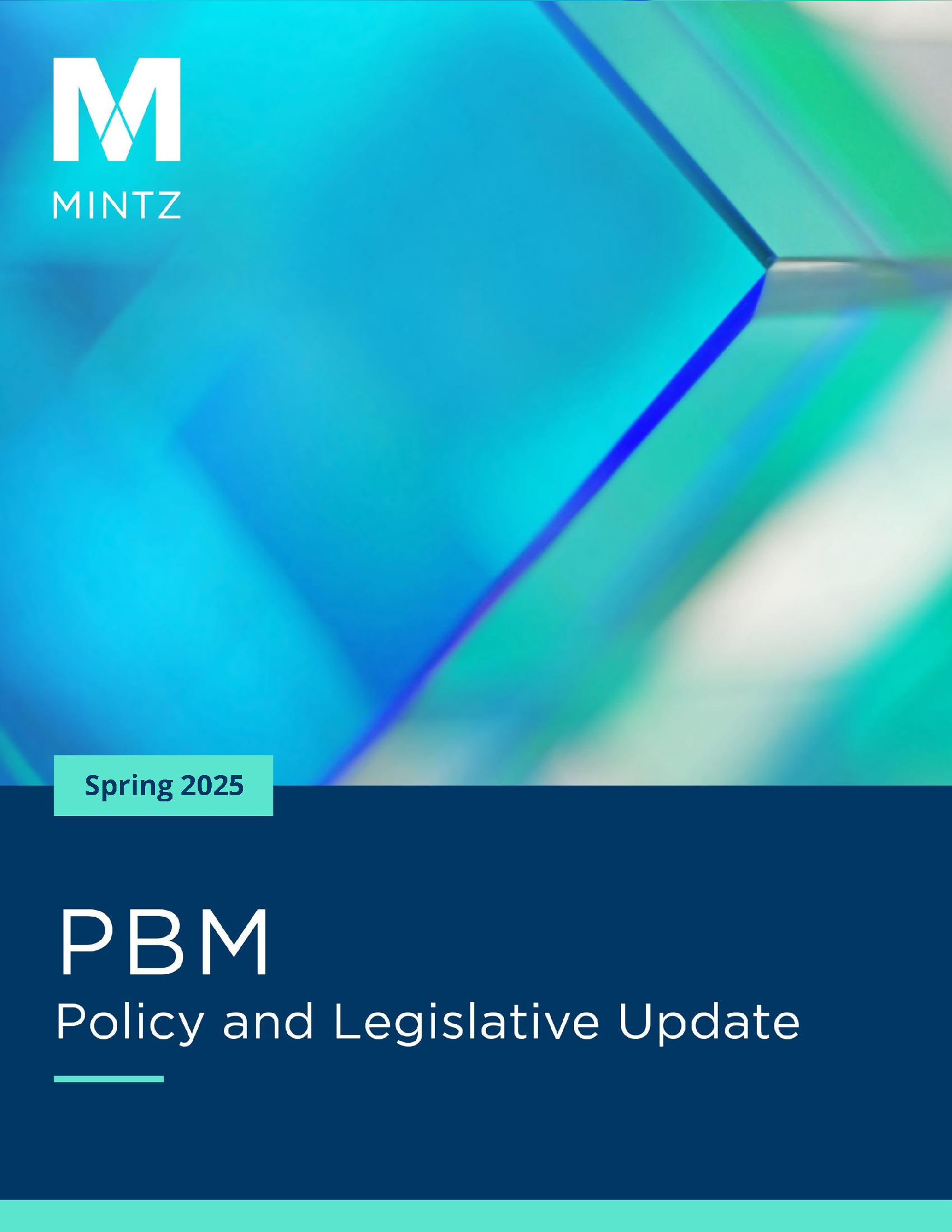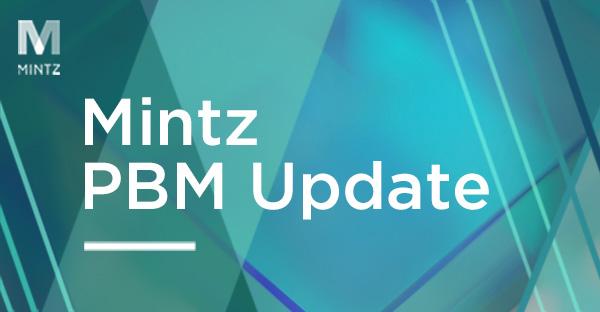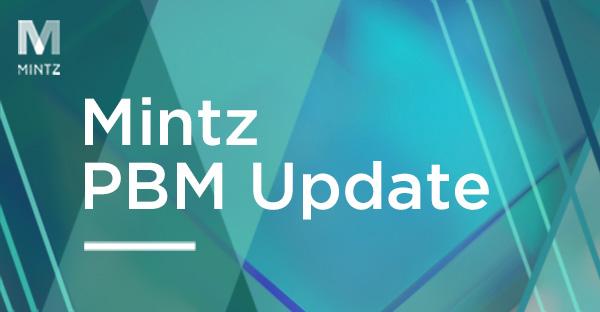PBM Policy and Legislative Update — Spring 2025
Mintz’s Managed Care Practice is pleased to present its quarterly publication, PBM Policy and Legislative Update. This edition breaks down the key federal and state legislative developments shaping the PBM landscape this spring — from sweeping transparency reforms and industry responses to the latest FTC litigation and state-level momentum.
We hope you find the PBM Policy and Legislative Update to be a useful resource.
 |
PBM Podcast Companion Piece
For a quick listen of the top hits in the report, be sure to check out our 5-minute podcast here.
PBM Policy and Legislative Update — Spring 2025
The pharmacy benefits management (PBM) regulatory landscape is rapidly evolving at both federal and state levels, making it critical for our clients involved in the PBM space to stay apprised of developments in the industry as they happen. Our team actively monitors these developments in order to provide you with this quarterly PBM Policy and Legislative Update. In fact, so much has happened since January that we kept reopening this publication to update the news! We encourage you to check out the “Since we went to publication” section, which includes links to our real-time blog posts and analysis of the changing landscape. This issue of the PBM Policy and Legislative Update highlights federal and state activity from January, February, and March 2025.
Jump to a Section
| Federal Legislative Activity and Oversight | State Legislation and Litigation | Other Topics of Interest |
Federal Legislative Activity and Oversight
Federal Legislative Activity
Saving Seniors Money on Prescription Drugs Act (H.R. 950) . On February 4, 2025, Representatives Greg Landsman (D-OH) and Diana Harshbarger (R-TN) introduced the Saving Seniors Money on Prescription Drugs Act , which would require PBMs serving Medicare Part D plans and Medicare Advantage plans to, among other things, (i) disclose, in a fully transparent manner, all information related to the PBM’s performance against pricing guarantees or similar underlying cost performance measurements related to rebates, discounts, price concessions, or net costs; (ii) report to plan sponsors and the Centers for Medicare and Medicaid Services (CMS) an itemized list of drugs dispensed and data related to drug costs, claims and reimbursements, and the percentage of total prescriptions dispensed by affiliated pharmacies, among other information; and (iii) annually certify compliance with the bill’s requirements.
Pharmacy Benefit Manager Transparency Act of 2025 (S. 526) and Prescription Pricing for the People Act of 2025 (S. 527) . On February 11, 2025, Senate Judiciary Committee Chair Chuck Grassley (R-IA) and Senate Commerce, Science, and Transportation Committee Ranking Member Maria Cantwell (D-WA) reintroduced the Pharmacy Benefit Manager Transparency Act of 2025 and the Prescription Pricing for the People Act of 2025 . The reintroduced Pharmacy Benefit Manager Transparency Act of 2025 intends to prohibit PBMs from engaging in “arbitrar[y], unfai[r], or deceptiv[e]” pricing practices, mandate PBM transparency, and authorize appropriate enforcement actions. Specifically, the bill would, among other things, prohibit PBMs from (i) engaging in spread pricing; (ii) clawing back payments made to pharmacies, unless the pharmacy claim was submitted fraudulently; and (iii) lowering pharmacy reimbursements to offset reimbursement changes directed by the federal government for any federally funded health plans. As proposed, the bill carves out exceptions to the enumerated prohibitions if the PBM passes along or returns 100% of any price concessions to a health plan or payer, including any rebate, discount, or other price concession; or if the PBM provides full and complete disclosure of all costs and reimbursements for each prescription drug, each fee, markup, or discount charged or imposed by the PBM (including its affiliates or subcontractors), or the aggregate amount of all remuneration the PBM receives from manufacturers, including rebates, discounts, administrative fees, and any other payments or credits retained by the PBM. The bill would also require PBMs to provide an annual report to the Federal Trade Commission (FTC) and the Secretary of the Department of Health and Human Services (HHS) of the aggregate amount of spread retained by the PBM, among other information. In addition to the above, the bill requires the Comptroller General of the United States to study and submit to several Congressional committees a report on PBM practices, including data as to how the 10 largest PBMs use rebates and fees in their business practices. Finally, as proposed, the bill authorizes the FTC and state attorneys general to enforce its requirements, including by imposing civil penalties. In addition, the reintroduced Prescription Pricing for the People Act of 2025 would, among other things, direct the FTC to issue a report that addresses, among other things, whether PBMs: (i) charge payors a higher price than the PBMs’ reimbursement rates to PBM-owned pharmacies and unaffiliated pharmacies; (ii) steer patients for competitive advantage to any pharmacy, including pharmacies in which the PBM has an ownership stake; (iii) audit or review proprietary data of unaffiliated pharmacies to increase revenue or market share for competitive advantage; or (iv) use formulary designs to increase market share of higher-cost prescription drugs or depress the market share of lower-cost prescription drugs.
Bipartisan Health Care Act (S. 891) . On March 6, 2025, Senators Ron Wyden (D-OR) and Bernie Sanders (I-VT) introduced the Bipartisan Health Care Act . The proposed legislation is a standalone bill that includes those PBM reform provisions that were removed from the final December 2024 continuing resolution (December 2024 CR). As discussed in our Winter 2025 PBM Update, the proposed PBM reform provisions in the initial December 2024 CR would, among other things, (i) prohibit PBMs that contract with Medicare Part D plan sponsors from receiving any income other than bona fide service fees; (ii) require contracts between state Medicaid programs and PBMs or managed care organizations (MCOs) to be based on a pass-through pricing model, prohibiting spread pricing; and (iii) require PBMs to pass through 100% of rebates, fees, and other remuneration received from specified entities to group health plans or health insurers offering group health coverage. On March 14, 2025, Senators Wyden and Sanders brought the Bipartisan Health Care Act (S. 891) to the Congressional floor for a key procedural vote in an attempt to fast-track the bill’s passage through unanimous consent. Senator Rick Scott (R-FL) objected to passing the bill, stalling further efforts to pass the bipartisan PBM reform.
Protecting Pharmacies in Medicaid Act (S. 927) . On March 11, 2025, Senators Peter Welch (D-VT), Roger Marshall (R-KA), Mark Warner (D-VA), and Bill Cassidy (R-LA) introduced the Protecting Pharmacies in Medicaid Act . The proposed legislation would, among other things, prohibit PBMs and Medicaid MCOs from using spread pricing in their contracts with state Medicaid programs. Similar to the Bipartisan Health Care Act, this proposed bill also draws on language proposed in the initial December 2024 CR related to contract requirements between PBMs and (i) Medicaid MCOs, or (ii) state Medicaid programs, requiring such contracts to be based on a pass-through pricing model. Additionally, if enacted, this bill would charge the HHS Secretary with (i) conducting a survey of retail community pharmacy drug prices and applicable nonretail pharmacy drug prices to determine NADAC benchmarks; and (ii) making the survey information publicly available, including a list of pharmacies not in compliance with the survey’s reporting requirements.
Prescription Drug Transparency and Affordability Act (H.R. 2450) . On March 27, 2025, Representatives Kristen McDonald Rivet (D-MI), Buddy Carter (R-GA), Rob Menendez (D-NJ), and John James (R-MI) introduced the Prescription Drug Transparency and Affordability Act . The text of the proposed bill similarly relies upon language initially proposed in the December 2024 CR setting forth new and more stringent reporting obligations for PBMs. As proposed, the bill charges the Secretary of HHS with enforcing the reporting requirements by imposing civil monetary penalties of up to $100,000 for each violation of a PBM’s reporting obligations, including the disclosure of false information. Additionally, the bill would require HHS to make all reports publicly available.
House Hearings on Pharmacy Benefit Manager Practices. On February 26, 2025, Chairman of the House Committee on Energy and Commerce Brett Guthrie (R-KY), and Chairman of the Subcommittee on Health Buddy Carter (R-GA) held a hearing titled “ An Examination of How Reining in PBMs Will Drive Competition and Lower Costs for Patients .” The hearing focused on several bipartisan bills that would transform the PBM market by increasing PBM transparency, thereby lowering prescription drug pricing. The hearing included witness testimony from various stakeholders, including the president and CEO of the National Alliance of Healthcare Purchaser Coalitions, who spoke about, among other things, employers shifting their PBM to entities that are transparent or otherwise designed with a “separation of powers.”
A Growing Consensus for Federal PBM Action
In the wake of the removal of PBM reform from the December 2024 CR, a coalition of health care stakeholders — including employer groups, insurers, pharmacists, and consumer advocates — called on Congress and the Trump administration to prioritize federal PBM reform. In recent letters to lawmakers and the President, the coalition urged inclusion of PBM oversight measures in upcoming must-pass spending legislation, citing strong bipartisan and public support. The group’s message to President Trump specifically referenced his earlier pledge to cut drug prices by eliminating “middlemen,” encouraging him to build on prior momentum.
The push also reflects ERISA plans’ search for relief from the mounting challenges of a patchwork of inconsistent state PBM rules. The ERISA Industry Committee (ERIC) ramped up its advocacy in favor of a federal solution to streamline compliance and reduce regulatory friction. Despite past signals from the Trump administration in support of reform, concrete details around the administration’s position on federal PBM reform are currently unclear. We are continuing to watch closely for any shift in public messaging or legislative movement from the Trump administration or Congress.
Responding to the pressure, PBMs announced changes that would address some of the concerns raised by legislators and other stakeholders.
- On January 29, 2025, the Cigna Group announced that its PBM affiliate, Express Scripts (ESI), would implement changes aimed at lowering patients’ out-of-pocket drug costs at the pharmacy counter. Specifically, patients with ESI coverage will not pay the full list price of a drug and instead will benefit from discounts negotiated by the PBM at the pharmacy counter. In addition, patients with ESI coverage who have high out-of-pocket costs will not pay more than their employer for the medication. These policies are designed to ensure that rebate dollars that were previously going to employers would now directly benefit patients. ESI also responded to transparency critiques by proposing to (i) give health plan sponsors more detailed reporting about pharmacy claims and (ii) provide patients more disclosure about their drug costs and discounts, including a summary that details their annual total prescription drug costs, prices, negotiated savings (discounts and rebates), plan payment amounts, and total savings.
- In January, UnitedHealth Group stated that its PBM affiliate, OptumRx, would move to pass 100% of rebates received from drug manufacturers to the insurers, states, and unions that it contracts with by 2028. Then, starting May 1, OptumRx announced that it would ease renewal requirements for certain long-term medications, eliminating up to 25% of reauthorization requirements for medications for patients with chronic conditions (such as asthma, cystic fibrosis, etc.). This shift is expected to remove prior authorization requirements from about 10% of OptumRx-covered drugs. Patrick Conway, OptumRx CEO, noted, “What we are trying to do is change the industry through market-based changes.” But the extent to which these actions could preempt continued proposals from lawmakers to regulate the PBM industry remains to be seen.
FTC Oversight
Since our last update, a convoluted turn of events occurred in the FTC’s in-house PBM litigation and associated matters. Following the dismissal by President Trump of minority party FTC Commissioners Rebecca Kelly Slaughter and Alvaro Bedoya at the end of March, the PBMs moved to have the FTC’s insulin rebate litigation stayed because the recusal of majority party Commissioners Ferguson and Holyoak left no sitting FTC commissioners able to participate in the matter. (Recall that Chairman Ferguson and Commissioner Holyoak recused themselves at the outset of the litigation because of their participation in PBM matters at the Virginia and Utah solicitors general’s offices, respectively.)
The FTC’s General Counsel issued an order on April 1 staying the proceedings for at least 105 days and setting the date of the evidentiary hearing before the administrative law judge (ALJ) for 225 days thereafter. By the end of the same week, Chairman Ferguson un-recused himself to ensure continuity of the case — noting that his original reason for recusal was that he merely advised on whether the Commonwealth of Virginia’s attorney general should file an amicus brief in a class action against PBMs and that he had consulted closely with the FTC’s ethics attorneys in reversing his recusal decision. Commissioner Holyoak maintained her recusal, and a third Republican Commissioner, Mark Meador, was confirmed by the US Senate on April 10, 2025. Chairman Ferguson’s revocation of his recusal and the confirmation of Commissioner Meador mean that there will be a quorum of FTC commissioners available to participate in the PBM litigation. We expect the stay will be lifted on July 15 and the adjudicative proceedings will continue toward the evidentiary hearing before the FTC’s ALJ in early 2026.
These procedural hurdles to the FTC’s administrative litigation ran parallel to happenings in other federal court proceedings. One of those proceedings involves various constitutional debates regarding the at-will removal protections for FTC Commissioners resulting from the 1935 Humphrey’s Executor Supreme Court case. Commissioners Rebecca Kelly Slaughter and Alvaro Bedoya have challenged their firings from the FTC in federal court, and the Trump administration has defended its right to remove them. ESI has criticized the removal protections in its court filings, and the issue is ripe for pressure testing — most acutely because the Trump administration has taken the position that it will not defend the Humphrey’s Executor precedent due to the firing of the two minority party FTC Commissioners back in March.
Prior to the stay issued by the FTC General Counsel, both a US district court in Missouri and the Eighth Circuit refused to pause the FTC’s in-house litigation while the PBM respondents litigate their constitutional challenges to the removal protections and the FTC’s administrative process. The district court found that pausing the action was an inappropriate step and declined to enjoin the FTC from acting under its long-standing congressionally mandated authority. The PBM respondents appealed to the Eighth Circuit, where the district court’s denial of the injunction was affirmed .
In separate litigation , ESI is challenging the FTC’s 2024 PBM Report, which ESI argues was rash, political, prejudicious, and violative of due process. The parties recently submitted a joint brief stating that ESI, the FTC, and Chairman Ferguson agree that former Chairwoman Khan’s departure does not affect ESI's allegations or claims beyond its request for an injunction to recuse Khan from FTC actions pertaining to ESI. In the filing, the parties agreed that: (i) ESI’s allegations that former Chairwoman Khan was biased against PBMs when the reports were drafted and released remain potentially relevant to ESI’s defamation and due process claims; (ii) ESI’s claims under the Administrative Procedure Act (APA) are unaffected by Khan’s departure; and (iii) ESI’s structural Article II challenge to for-cause removal protections for FTC Commissioners is not specific to former Chairwoman Khan and is unaffected by her departure. The parties further take the position that the defendants’ motion to dismiss is ripe for adjudication without the need for filing an amended complaint, and they argue that the case should proceed in the ordinary course.
In other related news, former FTC Chairwoman Lina Khan sued CVS just before her departure for not fully complying with the original civil investigative demand (CID) issued to CVS at the outset of the FTC’s PBM insulin and rebate investigation. This litigation resulted in an enforcement order requiring the company to comply with the CID.
It is unclear what impact the events of the past few weeks will have on the timing of the adjudicative proceedings and evidentiary hearing before the FTC’s ALJ — though, as noted, we expect that the FTC will lift the stay in July and the PBM respondents will be forced to continue litigating in the administrative forum. We will continue to report on updates in the FTC litigation and related matters as they develop.
State Legislation and Litigation
Recently Enacted State Legislation
States enacted the following initiatives during the first quarter of 2025. The initiatives listed below impact:
(i) PBM contracts with pharmacies and providers; (ii) pharmacy pricing and reimbursement requirements; (iii) pharmacy network requirements; and/or (iv) PBM licensure and registration requirements. Our Summer 2025 Edition will include updates on the Arkansas, Iowa, and other PBM laws enacted in April and May 2025. In the meantime, you can find real-time updates on these laws through our blog.
January – March 2025
| State | Description of Measure(s) | Date(s) Enacted | Effective Date(s) |
|---|---|---|---|
| Massachusetts | H. 5159. Among other things, this law requires PBMs to (i) pay to the Commonwealth an amount for the estimated expenses of the Health Policy Commission and establishes timelines for when such payments must be made; (ii) submit to the Center for Health Information and Analysis certain available data and information pertaining to rebates, and the PBM’s practices of spread pricing, administrative fees, clawbacks, and formulary placement; (iii) and obtain a PBM license. The act further (i) imposes prohibitions on contractual relationships; (ii) establishes fines for violating the PBM licensure requirements; (iii) outlines prohibited acts that could lead to the PBM’s licensure revocation; and (iv) requires the PBM to disclose certain conflicts of interest to carriers. | 1/8/2025 | The commissioner of insurance shall promulgate regulations to implement the PBM licensing and regulation requirements no later than October 1, 2025. 10/1/2025 – Initial payment deadline 1/1/2026 – PBM licensure deadline |
| Missouri | H.B. 17. Among other things, the law prohibits insurers, PBMs, and agents from (i) refusing to pay providers for providing covered physician-administered drugs; and (ii) requiring covered individuals to pay penalties or fees beyond cost-sharing amounts in order to obtain the physician-administered drugs. The law also requires providers to be reimbursed at contractually specified rates, or if such rate is not agreed upon, then at the wholesale acquisition cost. | 3/21/2025 | 3/21/2025 |
| North Dakota | H.B. 1087. Amends existing law to require PBMs and administrators operating in North Dakota to obtain a license from the state’s commissioner rather than a certificate of authority. | 3/14/2025 | 8/1/2025 |
| Utah | H.B. 257. Among other things, this law requires a PBM to offer an option for the self-funded benefit plan’s design that: (i) ensures each manufacturer rebate is used exclusively to benefit enrollees using certain methods; (ii) passes down the rebate using certain approaches; (iii) does not prohibit or condition participation in one pharmacy network on participation in another pharmacy network; and (iv) does not include spread pricing. | 3/27/2025 | 5/7/2025 |
Pending State Legislation
State legislators introduced over 215 bills from January through March of this year. Please click here for our standard chart categorizing the state proposals by topic.
Michigan Lawmakers Propose Independent Oversight Agency for Drug Pricing. In February of this year, Michigan lawmakers reintroduced a bill aiming to create a Prescription Drug Affordability Board (PDAB) charged with analyzing prescription drug prices and identifying ways to implement pricing transparency and cut drug costs. As proposed, the PDAB would consist of experts in economics, health care, supply chain management, and academia, and would intentionally exclude individuals with ties to the pharmaceutical industry. With this proposed bill, Michigan is among a number of other states with pending PDAB legislation and, if enacted, Michigan would join Colorado, Oregon, Ohio, Minnesota, New York, New Jersey, New Hampshire, Massachusetts, Maryland, and Maine in their existing efforts to address escalating prescription drug costs through state-level oversight.
Montana Proposal to Address Pharmacy Reimbursement by PBMs. In an effort to build on PBM legislation passed in Montana in 2023, the state’s legislature is currently considering H.B. 740, a bill that would further expand regulation of PBMs by requiring PBMs to reimburse independent pharmacies in accordance with NADAC pricing, plus a minimum dispensing fee of $15 (subject to yearly increases to account for inflation). The proposed bill, which is backed by a coalition of independent pharmacies, includes provisions that would, among other things, prohibit PBMs from (i) charging pharmacies any claim-related or enrollment-related fees; and (ii) recouping funds from pharmacies based on the timing of drug purchases, as long as the purchase occurred in accordance with applicable state or federal laws. Although the bill has drawn scrutiny from several PBM-affiliated trade groups — which flag that the proposed legislation could lead to higher costs for health plans and employers — the bill has been swiftly moving through Montana’s legislative process.
New York – PBM Oversight Measures Embedded in Governor’s Executive Budget Proposal. Governor Kathy Hochul’s FY 2025–2026 Executive Budget included a proposal that would have made New York the first state to require PBMs to publicly disclose the aggregated dollar amount of rebates they receive from drug manufacturers. New York is already among the 31 states that require PBMs to share rebate details with health plans. However, Governor Hochul’s FY 2025 proposal, which would apply to rebates, fees, and any other payments received by PBMs, aimed to specifically increase consumer pricing transparency by making this information publicly available. Since its introduction, the proposal has been amended to instead require PBMs to make certain detailed disclosures to the New York Superintendent of Financial Services regarding the terms and conditions of rebate contracts or other financial arrangements related to the PBM services provided to health plans (i.e., dispensing fee payments, refunds, and reimbursements), as well as any remuneration or other fees or benefits received by PBMs.
State Law Challenges
Tennessee ERISA Ruling. On March 31, 2025, a district court in Tennessee ruled that ERISA preempts certain Tennessee laws to the extent they apply to self-funded ERISA plans. Tennessee Public Chapters 569 and 1070 require PBMs to admit any willing pharmacy into their networks without showing preference for one pharmacy over another and prohibit PBMs or covered entities from (i) interfering with patients’ choice of pharmacy in a way that violates Tennessee’s Any Willing Provider statute; or (ii) offering any financial incentives or disincentives to persuade a patient to use a certain pharmacy. In granting portions of McKee Foods’ motion for summary judgment, the court in McKee Foods Corp. v. BFP, Inc. held that those laws “are preempted by ERISA to the extent they apply to self-funded benefits plans governed by ERISA” and ruled that the codes created, amended, and incorporated by those laws are invalid as applied to those plans.
State Enforcement
Ohio’s AG, ESI, and Prime Ask Sixth Circuit to Proceed with Appeal. ESI, Prime, and the Ohio Attorney General’s Office filed a joint status report with the Sixth Circuit requesting that the defendants’ appeal be allowed to proceed. In March 2023, the Ohio Attorney General’s Office filed suit in the Delaware County Court of Common Pleas against a number of PBMs and health care–related entities, including Prime and ESI, alleging that the entities violated Ohio’s Valentine Act and Deceptive Trade Practices Act by colluding to fix prescription drug prices. However, the companies removed the case to federal court. In January 2024, the district court remanded the case to Ohio state court, stating that it did not have jurisdiction. Soon after, the defendants appealed the district court’s decision. In October 2024, the Sixth Circuit issued an order holding the case in abeyance (temporarily pausing the appeal) pending the US Supreme Court’s decision in Royal Canin USA Inc. et al. v. Wullschleger. However, the parties agreed that SCOTUS’s decision in Royal Canin did not resolve the federal-versus-state jurisdiction issues applicable for the defendants’ appeal and recently asked the Sixth Circuit for briefing to proceed with the appeal.
Other Topics of Interest
Opioid Suits
We continue to track the ongoing litigation against PBMs alleging their contribution to the national opioid crisis. Here we summarize a few case updates from the last quarter:
States Fight to Keep Opioid Cases in State Court. The Michigan Attorney General argued for remand to state court of its October lawsuit accusing ESI and OptumRx of colluding with opioid manufacturers to prioritize opioids on insurance formularies in exchange for rebates ( Attorney General of the State of Michigan v. Evernorth Health, Inc. et al. ). The PBMs moved the case to federal court, citing the federal officer removal statute and arguing that Michigan’s claims are tied to work the PBMs performed for federal entities, specifically the Federal Employee Health Benefit Program and TRICARE. The PBMs contend that their operations for both federal and nonfederal clients are intertwined, making it impossible to separate their conduct on behalf of federal and private clients. They argue that the development of drug formularies and rebate negotiations span both types of plans. The PBMs further referenced recent decisions by the First and Ninth Circuits, which upheld the removal of similar cases to federal court, emphasizing that work for federal clients cannot be disentangled from private-sector allegations. Notably, the state’s complaint explained that it “is not seeking relief for any and all claims for damages against any defendant whose conduct whether by omission or commission, was engaged in at the behest of the United States or any agency or person... or under color of such office.”
Similarly, ESI and OptumRx are urging the Ninth Circuit to remove to federal court California’s public nuisance lawsuit over the PBMs’ alleged opioid dispensing practices. The PBMs argue that keeping the case in state court creates a circuit split with a First Circuit decision, which held that disclaimers in complaints cannot override the grounds for federal officer removal. California initially filed the case in state court, alleging the PBMs fostered an illegal secondary market for prescription opioids. The PBMs removed the case to federal court, citing work with federal programs like TRICARE. However, US District Judge Sherilyn Peace Garnett remanded the case back to state court, rejecting federal jurisdiction arguments. During oral arguments before the Ninth Circuit, the PBMs claimed their alleged conduct involved both private and federal plans, thereby justifying federal court jurisdiction. California countered, asserting it excluded federal claims in its complaint and focused solely on the PBMs’ practices with private health plans. Judges from the Ninth Circuit panel questioned the applicability of First Circuit precedent, highlighting distinctions between the insulin pricing claims in the First Circuit case and California’s public nuisance claims targeting opioid dispensing practices.
The judges continue to deliberate on these matters and we will keep you apprised of any updates.
US Chamber of Commerce Writes Amicus Brief Defending PBMs’ Privacy of Internal Audit Records. In January, the US Chamber of Commerce filed an amicus brief urging the Sixth Circuit to block a federal judge's order requiring ESI and OptumRx to disclose internal regulatory compliance audit documents prepared by or under the supervision of in-house counsel. The Chamber of Commerce argues this decision undermines attorney-client privilege for compliance audits, emphasizing that such audits are “quintessentially legal” in nature. The case stems from multidistrict opioid litigation overseen by Judge Dan A. Polster, who determined the compliance audits served a business purpose rather than a legal one, finding that compliance with regulations in such a heavily regulated industry is part of “day-to-day” business operations. The Chamber of Commerce warns this reasoning may have the effect of discouraging companies from conducting compliance audits. On the same day, Judge Polster ordered the production of personnel files for employees of ESI and OptumRx involved in the bellwether trial regarding their alleged role in the opioid epidemic. Both companies have petitioned the Sixth Circuit for relief, citing privacy concerns and questioning the relevance of the orders.
Boston Litigation Update. In February, a Massachusetts federal judge dismissed the City of Boston's lawsuit against ESI and OptumRx, ruling the city filed too late to pursue public nuisance and RICO claims regarding the opioid crisis. Judge Patti B. Saris determined that Boston knew of the harm caused by opioid over-prescribing years before filing the complaint, as evidenced by widespread litigation against the PBMs beginning in 2018, when the first multidistrict litigation was filed and when Boston sued other parties (e.g., manufacturers, distributors, and pharmacies) for alleged involvement in the opioid epidemic. Boston argued that the PBMs “fraudulently concealed” their role in the epidemic, but the court rejected this argument for extending the statute of limitations, finding the city was aware of its injuries well before filing the lawsuit. The judge also ruled that the city failed to prove ongoing misconduct by the defendants and declined to address whether private plaintiffs may obtain equitable relief under RICO claims, citing insufficient evidence of continued harm.
Insulin Pricing Updates
A variety of states continue to make headway in capping the price of insulin through lawsuits against the largest insulin manufactures and their PBMs. Here is a roundup of recent events in this space:
The Minnesota Attorney General reached a settlement with Novo Nordisk to cap insulin prices at $35, making Novo Nordisk the third insulin manufacturer to settle with Minnesota over insulin prices. Last year, the Minnesota Attorney General reached similar settlements with Eli Lilly and Sanofi. The settlements resolve a 2018 lawsuit brought against the insulin manufacturers by the state, who alleged that all three insulin manufacturers deceptively raised their insulin prices. Insulin is now available at $35 for people with and without insurance in Minnesota.
In January, the Massachusetts Attorney General filed a lawsuit against the three largest PBMs and three largest insulin manufacturers, alleging that they colluded in an insulin pricing scheme to artificially raise insulin prices. The complaint argues that insulin manufacturers Eli Lilly, Sanofi, and Novo Nordisk raised the price of insulin and paid PBMs OptumRx, ESI, and CVS as a quid pro quo for favorable placement on their drug formularies. The complaint, which mirrors complaints brought by other state AGs against PBMs and insulin manufacturers, alleges that the pricing scheme violates the Massachusetts Consumer Protection Act.
California’s CalRx program to produce low-cost, state-branded insulin has been delayed beyond its targeted 2024 start date, with no clear timeline for insulin distribution. California is the first state to attempt to produce its own generic prescription drugs under its own label. According to Civica, Inc., the nonprofit drug manufacturer contracted to develop biosimilar insulin, regulatory hurdles and clinical trial delays are behind the delays — delays the Newsom administration says fall within industry norms. However, some state lawmakers argue that Newsom’s vetoes of state bills to cap insulin costs and regulate PBMs signal an overreliance on CalRx and allow PBMs to avoid accountability for their role in raising the price of insulin.
Baltimore City Public Schools joined a growing wave of lawsuits nationwide against drug manufacturers and PBMs for allegedly colluding to inflate the cost of insulin. In its complaint, the school district alleges that Eli Lilly, Novo Nordisk, UnitedHealth, and CVS engaged in a pricing scheme that forced the school district to overspend on insulin for its employees — straining its budget and impacting educational resources. This lawsuit aligns with similar legal actions filed by dozens of other school districts and the City of Baltimore itself.
US District Court Judge Dismisses Sherman Act Claims Against CVS and Caremark
A Mississippi federal judge dismissed antitrust claims brought by Rx Solutions, Inc., a Mississippi pharmacy, against CVS Pharmacy, Inc. and Caremark, LLC. In 2014, Rx Solutions sued CVS and Caremark for allegedly monopolizing the local prescription drug market and engaging in anti-competitive behavior by denying Rx Solutions entry into their PBM network. The court dismissed the Sherman Act claim because Rx Solutions failed to plead facts that showed a market that could be monopolized and failed to allege that CVS and Caremark held a “predominant share” of the market, a requirement to establish a Sherman Act claim.
Maryland PDAB Expansion Clears Legislature, Awaits Governor’s Signature
Maryland lawmakers voted to approve the expansion of the Maryland Prescription Drug Affordability Board’s (PDAB) authority. H.B. 0424 / S.B. 0357 , approved by the Maryland House and Senate, respectively, establish a procedure through which Maryland’s PDAB may set upper payment limits (UPLs) on all purchases and reimbursements related to prescription drug products that the PDAB determines to be unaffordable. The legislation also grants new authority for the PDAB to reconsider a previously implemented UPL in the event of a drug shortage. The state legislature’s passage of the bill marks the culmination of a contentious effort to expand the PDAB’s authority. As we noted in our Summer 2024 edition, members of the Maryland PDAB previously expressed frustration with the PDAB’s slower-than-expected cost-review process at one of its public meetings. It remains to be seen how, if at all, the PDAB’s expanded authority will improve the pace of its drug cost reviews. Lastly, as has been seen in other states using drug price control boards to implement UPLs, it can be expected that the state will be the target of lawsuits challenging the PDAB’s new authority should the Maryland PDAB choose to use it.
From the desk of ML Strategies:
PBM Legislation in the New Congress
The ball is rolling on PBM legislation in the new Congress. On May 22, the House passed the reconciliation bill, or the One Big Beautiful Bill, with a slim 215 to 214 margin, which includes certain PBM measures. The PBM measures would, among other things, ban spread pricing in the Medicaid program, and in Medicare Part D, implement reporting requirements for PBMs, and limit PBM compensation to bona fide service fees. The reconciliation package is headed to the Senate. We continue to expect that some PBM reform measures are likely to be signed into law this year, and the reconciliation package provides a viable legislative vehicle.
Although the PBM legislation in the reconciliation package enjoys broad bipartisan support, it is limited compared to the reforms previously considered during this Congressional session and the last session. In early March, Senators Ron Wyden (D-OR) and Bernie Sanders (I-VT), Ranking Members of the Senate Finance and HELP Committees, respectively, attempted to pass a comprehensive PBM reform package discussed in the “Federal Legislative Activity” section above. These reforms were agreed upon by Democrats and Republicans back in December, when Congress attempted to include them in the initial December 2024 CR. While the Democratic Senators aimed to pass the package by unanimous consent in March, Republicans likely objected at that time so that PBM reform could be used as cost savings to offset other government spendings during the budget reconciliation process.
The PBM reforms included in the current budget reconciliation package would reduce government spending on prescription drugs by implementing a pass-through pricing model in Medicaid. It would also limit payments for prescription drugs to the ingredient cost and a professional dispensing fee.
The reconciliation package also includes reforms that would create regulations for all PBMs that contract with Medicare Part D prescription drug plan sponsors. Specifically, the reconciliation package proposes to:
- Require that all rebates or discounts received by a PBM are passed through in their entirety to a Part D plan sponsor;
- Limit PBM compensation to bona fide service fees and delink PBM compensation from the price of a drug; and
- Require PBMs to submit a report to the PDP sponsor and HHS Secretary that includes the list of all drugs covered, the average wholesale acquisition cost of the drug, average wholesale price for the drug, total rebates paid by the manufacturer on the drug, all other direct or indirect renumeration on the drug, and the average pharmacy reimbursement amount paid by the plan for the drug, among other information.
The PBM measures advanced by the House no longer contain proposals related to (i) commercial prescription drug benefits, or (ii) authorizing the Government Accountability Office (GAO) to study the compensation and payment structures of PBMs.
For questions or additional information, please reach out to Alexander Hecht or visit www.mlstrategies.com.

PBM Policy and Legislative Update — Winter 2025
February 10, 2025| Blog

PBM Policy and Legislative Update — Fall 2024
November 22, 2024| Blog
Authors
Rachel A. Alexander
Member
Theresa C. Carnegie
Member
Tara E. Dwyer
Member
Lauren M. Moldawer
Member
Bridgette A. Keller
Member

Pamela Polevoy
Madison M. Castle
Associate
David R. Gilboa
Associate
Xavier G. Hardy
Associate
Samantha Hawkins
Associate
Stephnie A. John
Associate

Alison H. Peters
Abdie Santiago
Associate
Hassan Shaikh
Associate
Sophia Temis
Associate














